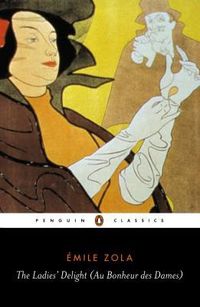
"The Ladies' Paradise" - Emile Zola (Oxford World Classics, 1886)
At long last I have read a book for the MA that I have genuinely enjoyed - rather than made mumbling noises about obscure premises and unilateral thinking, mumble mumble, in an attempt not to seem too stupid. So much so that I raced through it.
I'm preparing for my first major essay - 5,000 words on something to do with the role of women as consumers in modernist literature (I'm going to hammer out the precise question with my tutor tonight). But I'm an eager beaver and love to organise, and as such I have spent much time on the inernet and library catalogues and databases compiling a reading list, printing off relevant articles and checking books out of the library to photocopy surreptitiously at work. One of which was the 1886 novel "The Ladies' Paradise" by Emile Zola, which bears the original title "Au Bonheur Des Dames" (despite being half French, my French vocabulary doesn't extend much beyond GCSE level so I opted to read the English translation). And I'm so glad I did. I started it on Sunday morning and have just finished reading the 432nd (and final) page.
Denise is a French peasant who, after the death of her parents, moves to Paris with her two younger brothers for whom she feels responsible. Her draper uncle is unable to employ her because his business (along with that of all the other small traders in Paris) has been ruined by the engulfing Ladies' Paradise department store opposite - which acts as a mecca for the rich and spoilt French ladies. With no alternative, Denise accepts a job at the Paradise as a salesgirl, and her humble status as a bullied employee pales in comparison with the nauseating oppulence of the store's owner, the bored Mouret. As Denise's life progresses and she struggles to make ends meet for the welfare of her helpless brothers, it is sharply contrasted with the wealth and indulgence that Mouret is wrapped up in. Mouret is used to being gossiped about by his staff for his indiscretions with his salesgirls, but Denise refuses to be bought - she is a strong-willed girl who is determined to hang on to her morals, while all those around her are happy to drop their knickers to make a few francs. Throughout it all, the spectre of the Paradise grows ever larger and larger, like the shadow of a monster swallowing everything it sees and destroying everything - and everyone - in its wake. The store itself - referred to continually as a machine - is clearly the protagonist of this novel.
"The Ladies' Paradise" shows how one man, Mouret, takes women for fools: as lower class beings he can exploit for his own profit, both in the department store and in his boudoir. And the book also shows how one girl, Denise, unwittingly plays this powerful man at his own game, despite sticking to her old-fashioned morals. It is interesting that although this book was written nearly 150 years ago, the tale of woe regarding monopolisation, globalisation and commodidification still holds true, and it could just as easily be set today in this Starbucks, Virgin and Microsoft embossed world. I wonder when people will learn their lesson.
No comments:
Post a Comment